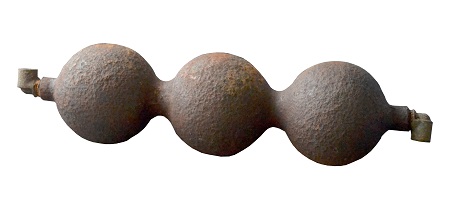Aircraft: Heinkel 111 H-2
Nationality: German

Flying from Roubaix, this aircraft was ordered to attack the RAF station at Gravesend. The aircraft failed to pick up the Knickebein navigation beam and instead tried to find the target by dead reckoning. The crew were further hampered by the loss of electrical power which meant that neither the variable pitch control for the airscrews nor the wireless could operate. The crew became hopelessly lost and the bomb load was jettisoned with the intention of flying due east to make landfall over the Netherlands. The crew believing they were over the Netherlands and unable to locate an airfield, took to their parachutes. In fact, the aircraft was over East Anglia and the abandoned Heinkel crashed in mud flats at Parkestone Quay, on the River Stour in Essex.
Nationality: German
Serial Number: 5536
Unit: 9 / KG53
Call Sign: A1 + LT
Date of Loss: 29/10/1940
Oxygen bottle from a Heinkel 111 bomber which crashed at 1.07am on the night of the 28/29th October, 1940.

Flying from Roubaix, this aircraft was ordered to attack the RAF station at Gravesend. The aircraft failed to pick up the Knickebein navigation beam and instead tried to find the target by dead reckoning. The crew were further hampered by the loss of electrical power which meant that neither the variable pitch control for the airscrews nor the wireless could operate. The crew became hopelessly lost and the bomb load was jettisoned with the intention of flying due east to make landfall over the Netherlands. The crew believing they were over the Netherlands and unable to locate an airfield, took to their parachutes. In fact, the aircraft was over East Anglia and the abandoned Heinkel crashed in mud flats at Parkestone Quay, on the River Stour in Essex.
The crew consisted of the pilot Ofw Karl Penzel, observer Florian Sigger, radio operator Uffz Johannes Klitscher, flight engineer, Ofw Hans Metzer and gunner Uffz Harry Ludicke. All five crew members survived and were captured.
